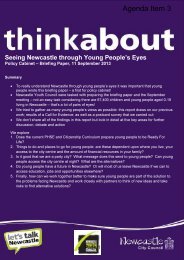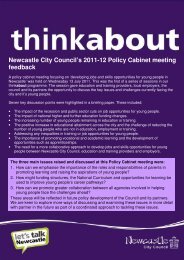NEWCASTLE'S MUSICAL HERITAGE AN INTRODUCTION By ...
NEWCASTLE'S MUSICAL HERITAGE AN INTRODUCTION By ...
NEWCASTLE'S MUSICAL HERITAGE AN INTRODUCTION By ...
Create successful ePaper yourself
Turn your PDF publications into a flip-book with our unique Google optimized e-Paper software.
CHAPTER FOURTEEN<br />
END OF A GOLDEN AGE<br />
An article in the Musical Times, published around the time of the First World<br />
War regretted that the war had brought about a deterioration in musical tastes. It<br />
said that there was plenty of music but what audiences sought was show and<br />
flourish, and theatrical glitter, and were pleased to applaud when they got it. It<br />
claimed that general taste had gone back thirty years, when the only interest in a<br />
programme lay in the number of popular performers, not in the choice of works,<br />
and the article concluded, ‘audiences’ had unwittingly changed’. I think the author<br />
was probably commenting, with some regret, on the passing of the old musical<br />
order, but it is a fact that cultural standards, if unchecked, do drop in times of<br />
war. But then in uncertain times the general public seek escapism not soul<br />
searching symphonic works: When separated by war what is Beethoven’s Ninth<br />
compared to a simple tune linked to a specific time and place and memory of a<br />
loved one. Regardless of the war, however, the many worthy music societies,<br />
that had been the mainstay of musical life up until then were dying. Musical<br />
interests were becoming less provincial with touring London theatre companies,<br />
visiting professional orchestras under conductors who were stamping their own<br />
personalities on the performances. It was becoming less a question of whose<br />
symphony it was but more a matter of whose interpretation it was. Choral singing<br />
was still very popular in the north but raised standards and the fact that people<br />
were finding other ways of spending their leisure time was having its effect. The<br />
brass band movement was surviving well although its peek had been in the<br />
1890s, when country-wide there had been around 40,000 bands. The movement,<br />
however, had organised itself nationally and established a centre for brass band<br />
competition at Belle Vue in Manchester. That other mainstay of working class<br />
enjoyment, the Music Hall, had long been on the wane, giving way to the more<br />
stylish and comfortable variety theatres. During the war and even after it was at<br />
the theatres that people found the escapism they were seeking, but the early<br />
cinema, the rising popularity of the gramophone, together with the rise of popular<br />
music and above all jazz were also claiming attention. However, there was one<br />
Newcastle musician who successfully raised musical standards in the city at this<br />
period and that was Dr W.G.Whittaker, Mus. Bac., F.R.C.O. In 1915 he founded<br />
the Bach Choir, which was to claim recognition beyond the banks of the Tyne<br />
and attract the attention of many of the country’s leading composers. <strong>By</strong> 1922 it<br />
was taking part in a three-day festival in London and by 1927 was appearing in<br />
Germany. The choir also performed at St Margaret’s Westminster and at Oxford.<br />
Dr Whittaker became one of England’ leading choral conductors and an authority<br />
on Bach. In 1914 he was already doing his bit for the war effort by mounting a<br />
Grand War Relief Music Festival at St. James’ Park Football Ground, where a<br />
choir and orchestra of one thousand two hundred and fifty performed favourite<br />
91

















